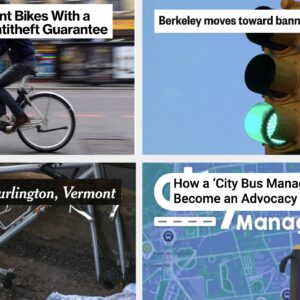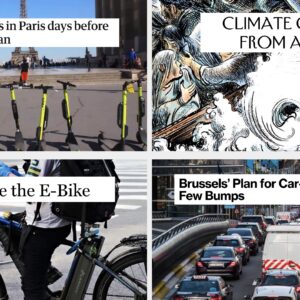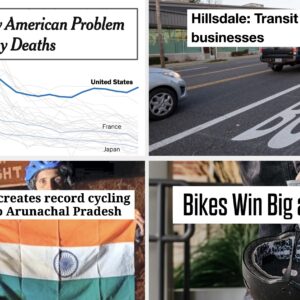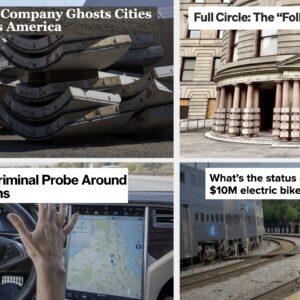Here’s the news that caught our eye this week:
– As the oil spill in the Gulf of Mexico continues to spread, we are continuing to not make the personal or policy connection between the disaster and oil consumption.
– Large scale bikesharing programs are taking off in the U.S. this year. First DC, then Denver…and now Minneapolis is launching the largest program yet with 700 bikes at 65 stations.
– Time reports on a new trend in repurposing—or just removing—parking lots
– The US department of housing and urban development (HUD) is working with the transportation department and committed itself to award housing funds based on “location efficiency,” with the explicit intent of counteracting sprawl.
– According to one report, people often drive when they could walk because the landscape for walking is often unappealing and boring. Check out this Scientific American podcast for more.
– And often, there is just nowhere to walk, as this woman found out when she followed online walking directions along a shoulderless, sidewalkless, state highway and was struck by a car. Her response? She’s suing Google.
– A man is charged with four counts of attempted murder after using his SUV to hunt down and hit people on bicycles in San Francisco.
– In LA, a bike ride protesting the BP oil spill was policed a little too heavy-handedly according to the cell phone movie footage taken by a man, whose digital document survived despite his phone being smashed as police allegedly beat and kicked him.
– The number of US teens who have drivers licenses is declining significantly, largely because of the internet.
– An insurance company survey has found that 38 million licensed drivers in the US would not be able to pass the written driving test today.
– Within the next 15 years, downtown Cairo, Egypt could become free of car traffic.
– Would you be in the market for a bike helmet that emitted a noxious smell when it became unsafe after a crash?







Thanks for reading.
BikePortland has served this community with independent community journalism since 2005. We rely on subscriptions from readers like you to survive. Your financial support is vital in keeping this valuable resource alive and well.
Please subscribe today to strengthen and expand our work.
The oil nightmare highlights the environmental problems of an oil dependent world.
Maybe the oil spill can be worked into this year’s naked bike ride?
The woman suing Google is a litigious moron. I read about her story several days ago.
It’s worse than suing McDonalds for hot coffee in your lap – it’s more like suing Juan Valdez for the hot coffee in your lap. Google didn’t build the roads, and is certainly not responsible if you choose to make bad decisions while using them.
The media should stop referring to “bicyclists”. That guy who went on a rampage was hitting “people on bikes”.
Elly, you might also be interested in this unenthusiastic take on increasing bike mode share in NYC. And I’m not pointing it out because I agree with what he says, entirely, but because I think the angle of bike/walk conflict is under-reported here. We definitely don’t have as much of said conflict as there is in NYC, but if we are serious about creating walkable neighborhoods we need to prepare for more. We need to understand all perspectives.
Sloth Racer (#1) – That’s actually the original purpose of the ride:
“In the beginning of WNBR, the message was balancing protesting against oil dependency and celebrating the power and individuality of the human body.”
(from: http://wiki.worldnakedbikeride.org/index.php?title=About)
and the current purpose says:
“World Naked Bike Ride (WNBR) is about protesting oil dependency and celebrating the power and individuality of our bodies. Naked bicycle people power!”
We view it a bit more socially here in Portland, but the ride is all about issues like the BP spill. If you want a more grass-roots approach, encourage your friends to come and body-paint oil-related slogans, etc. There’s a longstanding tradition of that at the WNBR.
who else doesn’t understand the craze for bikeshare programs? especially in cities that aren’t huge tourist draws. i’m missing something.
I wonder if the woman suing Google clicked “by foot” instead of “by car”? Or if she had the forethought to look at the satellite imagery that they provide to see if it’s someplace she’d want to walk? If not I’d chalk that up to Darwinism.
“Of course it’s true – I read it on the Internet!”
Pete – she intentionally chose the walking directions. Google provided the best directions it had; they just happened to be in an area where foot traffic wasn’t really possible. If you look at the map provided in the article, you’ll see that she has to cross a busy highway, and there are no alternatives to that.
(HUD) …to award housing funds based on “location efficiency,” with the explicit intent of counteracting sprawl
good news indeed.
There is another major cause of sprawl… School Districts at the edge of cities are often low on cash and have overcrowded schools, forcing them to buy cheaper land farther out, and those “new” schools are very attractive to real estate agents and buyers. One new suburban school can ruin 20 years of managed growth. Those districts are run by school boards who are often rich white republican parents who think suburbia is still the only way path to the future.
another monday edition of bikes vs cars
The new Minneapolis system has a hub a block from my apartment, the grand opening is this weekend. I’ll be sure to take some photos. I’m Portland’s biggest booster out here, but I gotta say, its impressive so far.